Loading AI tools
Honorary position in the United Kingdom From Wikipedia, the free encyclopedia
The British Poet Laureate is an honorary position appointed by the monarch of the United Kingdom on the advice of the prime minister. The role does not entail any specific duties, but there is an expectation that the holder will write verse for significant national occasions. The laureateship dates to 1616 when a pension was provided to Ben Jonson, but the first official Laureate was John Dryden, appointed in 1668 by Charles II. On the death of Alfred, Lord Tennyson, who held the post between November 1850 and October 1892, there was a break of four years as a mark of respect; Tennyson's laureate poems "Ode on the Death of the Duke of Wellington" and "The Charge of the Light Brigade" were particularly cherished by the Victorian public. Four poets, Thomas Gray, Samuel Rogers, Walter Scott[1] and Philip Larkin turned down the laureateship.[2] Historically appointed for an unfixed term and typically held for life, since 1999 the term has been ten years. The holder of the position as at 2025 is Simon Armitage who succeeded Carol Ann Duffy in May 2019 after ten years in office.[3]

The origins of the British poet laureateship date back to 1616 when James I of England granted a pension to the writer Ben Jonson.[4] Although there were subsequent court poets it was not until 1668, and the appointment of John Dryden by Charles II, that the post was made an established royal office within the royal household.[5][6] Dryden, who had been appointed following the success of his 1667 poem Annus Mirabilis, was dismissed from office in 1689 following the accession of the Protestant William III and Mary II to the throne. Dryden, a Catholic convert, refused to take the Oath of Allegiance to the new monarchs and he was dismissed from the laureateship—the only holder to have been removed from office.[7][8]
Dryden's successor, Thomas Shadwell, was appointed in 1689 for life. He introduced the custom of producing poems for the new year and the monarch's birthday, which became one of the key duties of the position.[9] After the appointment of William Wordsworth in 1843 the duties settled into an expectation, not requirement, for major court and national occasions. Alfred, Lord Tennyson held the post between November 1850 and October 1892. According to Andrew Motion and Hilary Laurie, Tennyson "gave the poet laureateship new status and significance" with works such as "Ode on the Death of the Duke of Wellington" and "The Charge of the Light Brigade". On his death the post was left vacant as a mark of respect; a new laureate was not appointed until four years later, with the appointment of Alfred Austin in January 1896.[10] As at 2015 the position is an honorary one, and the office holder is left to decide on which occasions they will produce poetry.[1][5] Following Dryden's dismissal from the post, the laureateship was held for life by all successors until Motion was appointed in 1999 for a fixed term of ten years; his successor, Carol Ann Duffy, was also appointed on the same fixed term.[11] Duffy was the first female poet to hold the role, and the first Scot.[9][12]
After Shadwell's selection the laureate was appointed by the Lord Chamberlain, on the monarch's instructions. Since the appointment of Henry James Pye in 1790, the prime minister has recommended which candidate to appoint.[1] For the appointment of Duffy the Department for Culture, Media and Sport (DCMS) undertook a consultation of academics and literary organisations to draw up a short list of recommendations which they presented to the prime minister. He, in conjunction with the Cabinet Office, then submitted the name to the Queen for approval.[11]
Dryden's salary for the laureateship was £200 per year. In 1630 Charles I added an annual "butt of Canary wine",[a] although this was later discontinued in place of the monetary equivalent.[9] When Ted Hughes was appointed, he rekindled the tradition, and received 720 bottles of sherry.[14] Since Motion's appointment the DCMS provided an annual honorarium of £5,750; Motion also received an additional £19,000 for his work in education. With Duffy's appointment, the salary returned to £5,750 and the barrel of sherry.[15]
| Poet laureate[1][4] | Portrait | Birth and death | Dates of laureateship | Appointed by | Length of tenure (years) |
Ref. |
|---|---|---|---|---|---|---|
| John Dryden |  |
1631–1700 | 13 April 1668 – 1688 | Charles II | 20 | [16][17] |
| Thomas Shadwell | 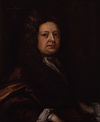 |
c. 1640–1692 | 9 March 1689 – 19 or 20 November 1692 | William III and Mary II | 3 | [18][19] |
| Nahum Tate | 1652–1715 | 23 December 1692 – 30 July 1715 | William III and Mary II | 23 | [20][21] | |
| Nicholas Rowe |  |
1674–1718 | 1 August 1715 – 6 December 1718 | George I | 3 | [22][23] |
| Laurence Eusden |  |
1688–1730 | 10 December 1718 – 27 September 1730 | George I | 12 | [22][24] |
| Colley Cibber |  |
1671–1757 | 3 December 1730 – 12 December 1757 | George II | 27 | [22][25] |
| William Whitehead | 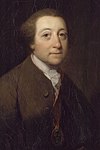 |
1715–1785 | 19 December 1757[b] – 14 April 1785 | George II | 27 | [22][26] |
| Thomas Warton |  |
1728–1790 | 20 April 1785 – 21 May 1790 | George III | 5 | [27][28] |
| Henry James Pye | 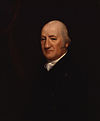 |
1745–1813 | 28 July 1790 – 11 August 1813 | George III | 23 | [29] |
| Robert Southey |  |
1774–1843 | 12 August 1813[c] – 21 March 1843 | George III | 30 | [22][31] |
| William Wordsworth |  |
1770–1850 | 6 April 1843 – 23 April 1850 | Victoria | 7 | [32][33] |
| Alfred, Lord Tennyson | 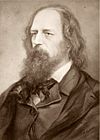 |
1809–1892 | 19 November 1850[d] – 6 October 1892 | Victoria | 42 | [32][34] |
| Alfred Austin |  |
1835–1913 | 1 January 1896 – 2 June 1913 | Victoria | 17 | [34][35] |
| Robert Bridges | 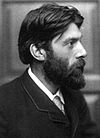 |
1844–1930 | 25 July 1913 – 21 April 1930 | George V | 17 | [36][37] |
| John Masefield |  |
1878–1967 | 9 May 1930 – 12 May 1967 | George V | 37 | [38][39] |
| Cecil Day-Lewis | 1904–1972 | 2 January 1968 – 22 May 1972 | Elizabeth II | 4 | [40][41] | |
| John Betjeman |  |
1906–1984 | 20 October 1972 – 19 May 1984 | Elizabeth II | 12 | [42][43] |
| Ted Hughes | 1930–1998 | 28 December 1984 – 28 October 1998 | Elizabeth II | 14 | [44][45] | |
| Andrew Motion |  |
1952– | 19 May 1999 – 1 May 2009 | Elizabeth II | 10 | [11][46] |
| Carol Ann Duffy |  |
1955– | 1 May 2009 – 10 May 2019 | Elizabeth II | 10 | [11] |
| Simon Armitage |  |
1963– | 10 May 2019 – present | Elizabeth II | 5 | [3] |
Seamless Wikipedia browsing. On steroids.
Every time you click a link to Wikipedia, Wiktionary or Wikiquote in your browser's search results, it will show the modern Wikiwand interface.
Wikiwand extension is a five stars, simple, with minimum permission required to keep your browsing private, safe and transparent.